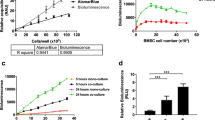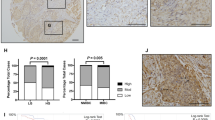Abstract
Because the toxicity of suicide gene therapeutics is directly related to basal promoter activity, we developed an assay to test for promoter “leakiness” using a diphtheria toxin mutant. Sequences of 15 prostate-specific gene promoter constructs were cloned in an expression plasmid (pBK; Stratagene, La Jolla, CA) backbone driving expression of an attenuated mutant of diphtheria toxin A (tox176). Low expression levels of the DT-tox176 result in significant protein synthesis inhibition reflected by a decreased expression of the luciferase activity of a simultaneously transfected CMV luciferase construct. ID50 (dose of plasmid with 50% luciferase inhibition) was calculated for each promoter construct in different cell lines. Highest transactivational activity (ID50 <75 ng) was found for the CMV promoter in all cell lines, which is in agreement with the dual luciferase assay findings. Unlike the dual luciferase findings, however, the DT-tox176 assay showed protein inhibition of CN65 (PSA promoter/enhancer) and PSE–hK2 (PSA enhancer and basal human kallikrein 2 promoter) in HEK293 and DLD cells indicating “leakiness” of these promoter constructs. Low basal promoter activity in nonprostate cell lines was found for the minimal PSA promoter, hK2, DD3, and OC promoters. The DT-tox176 assay can better predict basal promoter activity compared to less sensitive dual luciferase assay. Cancer Gene Therapy (2001) 8, 927–935
This is a preview of subscription content, access via your institution
Access options
Subscribe to this journal
Receive 12 print issues and online access
$259.00 per year
only $21.58 per issue
Buy this article
- Purchase on Springer Link
- Instant access to full article PDF
Prices may be subject to local taxes which are calculated during checkout
Similar content being viewed by others
References
Scher HI, Fossa S . Prostate cancer in the era of prostate-specific antigen Curr Opin Oncol 1995 7: 281–291
Herman JR, Adler HL, Aguilar-Cordova E, et al . In situ gene therapy for adenocarcinoma of the prostate: a phase I clinical trial Hum Gene Ther 1999 10: 1239–1249
Koeneman KS, Kao C, Ko SC, et al . Osteocalcin-directed gene therapy for prostate cancer bone metastasis World J Urol 2000 18: 102–110
Rodriguez R, Schuur ER, Lim HY, et al . Prostate-attenuated replication competent adenovirus (ARCA) CN706: a selective cytotoxic for prostate-specific antigen-positive prostate cancer cells Cancer Res 1997 57: 2559–2563
Yu DC, Chen Y, Seng M, et al . The addition of adenovirus type 5 region E3 enables calydon virus 787 to eliminate distant prostate tumor xenografts Cancer Res 1999 59: 4200–4203
Dyer BW, Ferrer FA, Klinedinst DK, et al . A noncommercial dual luciferase enzyme assay system for reporter gene analysis Anal Biochem 2000 282: 158–161
Schuur ER, Henderson GA, Kmetec LA, et al . Prostate-specific antigen expression is regulated by an upstream enhancer J Biol Chem 1996 271: 7043–7051
Good D, Schwarzenberger P, Eastham JA, et al . Cloning and characterization of the prostate-specific membrane antigen promoter J Cell Biochem 1999 74: 395–405
Yu DC, Sakamoto GT, Henderson DR . Identification of the transcriptional regulatory sequences of human kallikrein 2 and their use in the construction of calydon virus 764, an attenuated replication competent adenovirus for prostate cancer therapy Cancer Res 1999 59: 1498–1504
Greenberg NM, DeMayo FJ, Sheppard PC, et al . The rat probasin gene promoter directs hormonally and developmentally regulated expression of a heterologous gene specifically to the prostate in transgenic mice Mol Endocrinol 1994 8: 230–239
Bussemakers MJ, van Bokhoven A, Verhaegh GW, et al . DD3: a new prostate-specific gene, highly overexpressed in prostate cancer Cancer Res 1999 59: 5975–5979
Choe S, Bennett MJ, Fujii G, et al . The crystal structure of diphtheria toxin Nature 1992 357: 216–222
Collier RJ . Diphtheria toxin: mode of action and structure Bacteriol Rev 1975 39: 54–85
Yamaizumi M, Mekada E, Uchida T, et al . One molecule of diphtheria toxin fragment A introduced into a cell can kill the cell Cell 1978 15: 245–250
Maxwell IH, Maxwell F, Glode LM . Regulated expression of a diphtheria toxin A-chain gene transfected into human cells: possible strategy for inducing cancer cell suicide Cancer Res 1986 46: 4660–4664
Maxwell F, Maxwell IH, Glode LM . Cloning, sequence determination, and expression in transfected cells of the coding sequence for the tox 176 attenuated diphtheria toxin A chain Mol Cell Biol 1987 7: 1576–1579
Burrows HL, Birkmeier TS, Seasholtz AF, et al . Targeted ablation of cells in the pituitary primordia of transgenic mice Mol Endocrinol 1996 10: 1467–1477
Rodriguez R, Lim HY, Bartkowski LM, et al . Identification of diphtheria toxin via screening as a potent cell cycle and p53-independent cytotoxin for human prostate cancer therapeutics Prostate 1998 34: 259–269
Sperisen P, Wang SM, Reichenbach P, et al . A PCR-based assay for reporter gene expression PCR Methods Appl 1992 1: 164–170
Kastenbauer S, Wedel A, Frankenberger M, et al . Analysis of promoter activity by polymerase chain reaction amplification of reporter gene mRNA Anal Biochem 1996 233: 137–139
Wood KV . Marker proteins for gene expression Curr Opin Biotechnol 1995 6: 50–58
Latham JP, Searle PF, Mautner V, et al . Prostate-specific antigen promoter/enhancer driven gene therapy for prostate cancer: construction and testing of a tissue-specific adenovirus vector Cancer Res 2000 60: 334–341
Wright GL, Grob BM, Haley C, et al . Upregulation of prostate-specific membrane antigen after androgen deprivation therapy Urology 1996 48: 326–334
O'Keefe DS, Uchida A, Bacich DJ, et al . Prostate-specific suicide gene therapy using the prostate-specific membrane antigen promoter and enhancer Prostate 2000 45: 149–157
Verhaegh GW, van Bokhoven A, Smit F, et al . Isolation and characterization of the promoter of the human prostate cancer-specific DD3 gene J Biol Chem 2000 275: 37496–37503
Acknowledgements
The authors acknowledge the helpful advice of Donald Coffey, William Nelson, Jonathan Simons, Theodore DeWeese, Dale vander Putten, and Thomas Gardner during the course of these experiments. We also thank Donna Klinedinst for technical assistance, and Helen Kelley for secretarial assistance. Funding came from CaPCure (Santa Monica, CA), The Robert Wood Johnson Foundation (Princeton, NJ), and the Dutch Cancer Foundation (Amsterdam, the Netherlands).
Author information
Authors and Affiliations
Corresponding author
Rights and permissions
About this article
Cite this article
van der Poel, H., McCadden, J., Verhaegh, G. et al. A novel method for the determination of basal gene expression of tissue-specific promoters: An analysis of prostate-specific promoters. Cancer Gene Ther 8, 927–935 (2001). https://doi.org/10.1038/sj.cgt.7700385
Received:
Published:
Issue Date:
DOI: https://doi.org/10.1038/sj.cgt.7700385
Keywords
This article is cited by
-
Bicalutamide-activated oncolytic adenovirus for the adjuvant therapy of high-risk prostate cancer
Cancer Gene Therapy (2013)
-
Enhanced combined tumor-specific oncolysis and suicide gene therapy for prostate cancer using M6 promoter
Cancer Gene Therapy (2009)
-
Functional characterization of the GDEP promoter and three enhancer elements in retinoblastoma and prostate cell lines
Medical Oncology (2008)
-
Androgen Receptor Attenuation of Ad5 Replication: Implications for the Development of Conditionally Replication Competent Adenoviruses
Molecular Therapy (2007)



